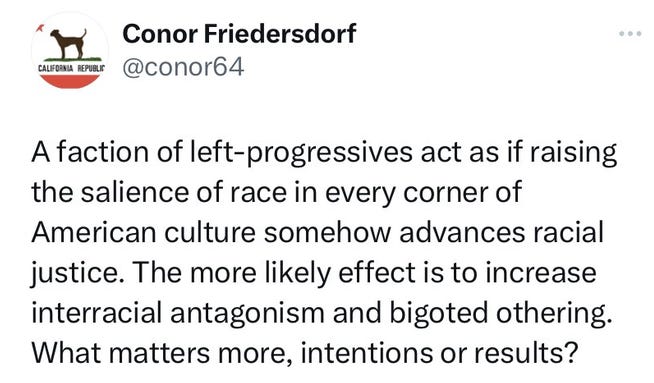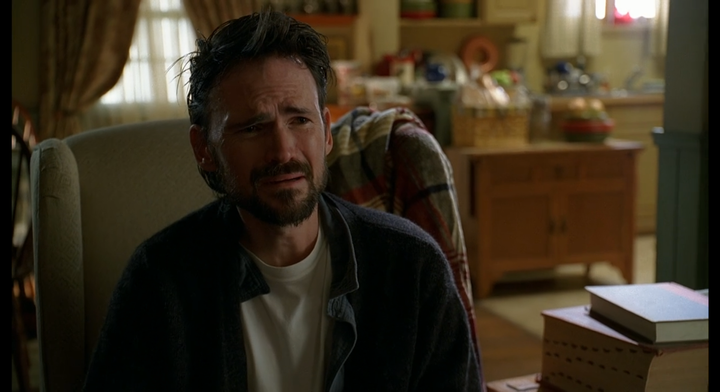The Main Stream
A very Bad Tweet that demonstrates the white supremacy of centrists, and the ways a submerged supremacy is our mainstream current.

I’ve been talking about the spirit moving through our culture, using a current as a metaphor, and I identified the current as supremacy, defined as a belief that some people matter and others don’t, and that the opinions and beliefs of people who matter should take preference over the lives of people who do not. Our national current of supremacy can take many forms—wealth supremacy, christian supremacy, male supremacy, able-bodied supremacy, and everything I have to say here will apply broadly to these manifestations, too—but to my perception, the main current in the river of U.S. culture, the delivery mechanism for all the others, is the one codified directly into our nation’s Constitution, and that is white supremacy.
So if you were trying to detect whether a culture was captured by a spirit of white supremacy, you'd examine whether there existed within it people whose ease was deemed more important than the lives of others, mediated through the perception of whiteness.
So now I want to talk about white supremacy, and a Bad Tweet.
This one comes from Atlantic contributor Conor Friedersdorf, who writes Bad Tweets professionally, in service of larger bad points he expands upon in longer essays (which tend to be quite bad). Friedersdorf is mostly published in the mainstream publication, The Atlantic, which publishes many excellent writers doing important and incisive journalism and cultural commentary, and which in the interests of balance also publishes many incurious privileged cranks writing a bunch of regurgitated nonsense and disposable both-sides horseshit. Friedersdorf is one who provides balance.
One hesitates to share a Bad Tweet, because garnering attention and outrage sometimes seems to be the point of Bad Tweets, but this one is so representative of this particular worldview, so illustrative of such a popularized viewpoint, I think it’s worth dissecting it to make some useful observations.
Here it is, the Bad Tweet:

OK? Let’s unpack.
There’s a big idea, supported, pillar-like, by a couple unspoken assumptions, and all of these support the mainstream white supremacist position, and that is what makes the tweet a Bad Tweet.
The big idea is this: talking about racism and racial injustice as pervasive, institutional, and historically intrinsic to U.S. culture and politics actually increases racial bigotry, so not talking about race as pervasive, institutional, and historically intrinsic to U.S. culture and politics is what we ought to do in order to practically achieve results commensurate with justice.
I think that represents a fair attempt to express Friedersdorf’s point. If you can come up with another interpretation, I’d love to hear it, if only because I might find the attempt amusing.
The big problems with the big point are that 1) racial injustice is pervasive, institutional, and historically intrinsic to U.S. culture and politics, and 2) not raising the pervasive, institutional, and historically intrinsic nature of racial injustice has never resulted in decreased racial bigotry or any results commensurate with justice, it has only ever resulted in 3) a more hidden bigotry and 4) more comfortable racists.
And we know this. We have known this for a long time, if we are people who are interested in knowing. I could make this essay a lot longer by putting a proof case together, but Kevin Kruse already did it, so I’ll just point to him, and briefly make the rather obvious point that one doesn’t typically do a very good job of treating a disease if one refuses to even acknowledge the diagnosis.
As I said last time, points like the one Friedersdorf make are perfectly understandable—meaning they can be understood—even if they are not reasonable or helpful, even if they’ve already been examined and tested and rejected long ago. In fact, with bad ideas, rejecting them is the natural result of understanding them. We’ve been to the mouth of this river again and again, and seen where the current takes us, to the point that anybody who is remotely curious about these things has to assume that when it comes to centrists making this point, intentions are perfectly aligned with the result, which, again, is hidden bigotry and comfortable racists.
It’s a very common idea, and very popular, especially in circles that consider themselves or are understood to be “centrist.” This is also a major white supremacist belief—which it ought to be, because it supports white supremacy so well. It validates the white supremacist idea that the people who matter should be mediated through the beliefs and perspectives of white people. It places white comfort and perspective above observable threat and harm to Black lives
So, with this tweet (and many other similar writings), Conor Friedersdorf is forwarding a white supremacist position—I’d say the white supremacist position.
Am I saying Conor Friedersdorf is a white supremacist?
Yes. I am.
The statement might seem incendiary to you. It might seem I am attacking Friedersdorf as an irredeemable monster, or creating a divisive “us vs them” dynamic. It might even seem I am calling him a nasty name simply because I disagree with his politics. I understand this point, but I believe this illustrates the ways we’ve been taught to misunderstand what white supremacy is, and why we’d do well to adjust our understanding.
I’m not attacking him, I’m just defining the spirt that his worldview supports, and I’m more than willing to explain how. I don’t think being a white supremacist really distinguishes Friedersdorf in any way, honestly. I think it’s just a way of saying he’s a mainstream thinker, and has plenty of company, which doesn’t only include centrists or the right wing reactionaries his positions ultimately help support. And I’m not creating an “us vs. them” dynamic, I don’t think, though I do think I’m observing one, and contemplating who is the “us” and who is the “them.”
So stick with me here; I’ll explain what I mean.
So that’s the big idea covered. I want to look at the two key assumptions supporting it.
1) Friedersdorf first posits as a problem “some on the progressive left act as if raising the salience of race in every corner of American culture somehow advances racial justice.” So either he believes that race is not salient in every corner of American culture, or he believes that it is, but that the thing that would spring from talking about that would not be justice, or both.
This represents a hugely popular view in mainstream right wing and centrist circles, and even can be found in some liberal or leftist ones. The main assumption here is that racism and all forms of bigotry must be understood exclusively as a matter of personal individual choice to actively believe in racial animosity and engage in acts of overt bigotry, and, therefore, whether or not somebody is racist is a personal choice that each person get to make about themselves.
This is also a major white supremacist belief, which it ought to be, because it supports white supremacy so well. It validates the supremacist idea that they are the ones who get to decide whether or not something is racist; it places white comfort and perspective above observable threat and harm to Black lives.
And certainly there are overt acts of bigotry everywhere we turn. If we draw only upon today’s news, Alabama’s governor has chosen to openly defy a Supreme Court edict to redraw its deliberately racist electoral boundaries. There’s a hit country song about lynching as a salutary traditional value of small towns. Texas’ governor has been instructing his border agents to push people seeking to cross the border—men, women, and children—into the Rio Grande. And Florida’s governor has launched an aggressive campaign against “woke,” a term coined by Black people to mean awareness of the pervasive institutional historical nature of American racism. Florida’s governor says his state is “where woke goes to die,” and he’s banning books, and history curriculum in his schools talks about how slavery was good for slaves, and he’s launched a presidential bid that’s getting a lot of mainstream attention.
So that’s some very overt racism.
This is where making racism an individual choice you get to make about yourself is so helpful for supremacy. Alabama’s governor can simply say that she is acting out of a duty toward “states’ rights,” which have in the past included the right to own slaves. The country singer can claim total ignorance of the history of lynching that he is clearly referencing, and his fans can all accept that claim and go on nodding their heads along. Texas’ governor can claim that he is just keeping his citizens safe, and it’s true that many people do seem to feel more secure and safe upon receiving news of children being pushed into a river. And Florida’s governor can decide that he’s just keeping white kids from feeling attacked by historical truth, and he can also decide what “woke” means now that he has taken possession of it, and he can decide whether or not it is racist to kill it and whatever or whoever it might represent in his state.
And you can believe them, too, if you want. It’s a personal decision, just like the decision to personally decide whether or not you’re being racist for deciding to believe exonerative rationales for acts that are clearly terrorizing, hurting, and killing racial minorities.
Then you can ignore or deny or otherwise make yourself comfortable with the fact that in every corner of our society, life—even if you utterly ignore the unignorable legacy of historicity and focus only on the modern—is more dangerous and harmful and fatal for Black people than it is for white people: that Black people are systemically disenfranchised, and statistically marginalized; over-policed, over-enforced, over-suspected, over-prosecuted, over-incarcerated; that neighborhoods with heavy Black populations tend to be underfunded and over-polluted; that Black mothers have higher mortality rates; that the pain of Black patients is statistically more likely to be ignored by medical professionals; that Black life expectancy is years lower when compared to white cohorts; that even the streets themselves are more dangerous—because even pedestrian deaths are statistically more likely to involve somebody who is Black.
And if you know that, then you’d need to wonder why, and start to think about whether you cared, and, if you cared, what might need to be done. And if you don’t want anything to be done, then you won’t want to know. And if you don’t want to know, then you won’t want to talk about it. The patient who doesn’t want the treatment refuses not only the treatment but even the diagnosis, even the test.
And then racism—specifically because we refuse to talk about how it exists in every corner of American life—can become an individual choice you get to make about yourself, not a civic social injustice toward which you bear some responsibility.
Meanwhile, in every corner of American life, racism happens, inexorably, automatically, as a part of the current of modern life. The system itself does it. Few people have to choose to be racist for it to happen.
Everyone just has to choose not to know.
And this is exactly what Friedersdorf is suggesting we do, in order as he would have it to increase justice, even though we can clearly see that it will only decrease knowledge of racism and increase the comfort of racists.
It’s a very mainstream white supremacist argument. And he’s making it.
And that’s why he’s a white supremacist.
2) The next point Friedersdorf makes is that talking about it will lead to increased interracial antagonism.
I think there are two ways to take this. Either he believes that talking about the pervasive nature of racism will cause white people to be accused unfairly of racism, or he means that being so accused will make racist people more racist and force previously un-racist people to reactionarily become racist.
This also represents a hugely popular view in mainstream right wing and centrist circles, and even can be found in some liberal or leftist ones. The main assumption here is that, since racism has been established as non-pervasive and individual, the most aggressive act of racism is accusation of racism, because acknowledgement of race is the root of racism—therefore it is talk about racism that causes racism.
This is also a major white supremacist belief—which it ought to be, because it supports white supremacy so well. It validates the white supremacist idea that the people who matter should be mediated through the beliefs and perspectives of white people; it validates the supremacist idea that white supremacists are the ones who get to decide whether or not something is racist; and it validates the idea that accusing a supremacist of racism they haven't agreed is racist is an aggressive act causing racism and justifying an aggressive response. It places white comfort and perspective above observable threat and harm to Black lives.
Again, this is an understandable point. I understand it.
I think we all can imagine the person that Friedersdorf is talking about: a person who in their individual life is not overtly and personally racist, but who supports many inherently racist policies, institutions and ideologies, and who will, if pressed to understand the intrinsically unjust nature of the policies, institutions and ideologies they support, angrily and reactionarily double down into an aggrieved and intensified support of those things; a person who, when confronted with the reality of pervasive, institutional, and historically intrinsic racism in U.S. culture and politics, feels personally attacked as a white person.
We all know people like this. The word for such a person is “a racist.”
Right?
If I hear about the injustice that attends white supremacy, and my reaction is not “I should be a part of the solution” but “I am being attacked” then I have, whether I’ve let myself know it or not, identified my whiteness with the injustice, and the benefits I know I receive from that injustice.
Right?
The topic was not me. The topic was the pervasive nature of racial injustice. Yet I feel attacked. Can I separate the two? Am I trying to separate myself from it as a pretext for not changing my worldview or my beliefs or my support? If the topic is injustice, why is not changing my priority?
If the knowledge of racism is what’s being exposed, and I insist it has nothing to do with me, then why would I also see the exposure as an attack? It’s almost as if I know something I don’t want told.
But if racism benefits me, and it is so pervasive, institutional, and historically intrinsic that it actually does exist in every corner of American life to the extent that I never even have to think about it in order to receive the benefit, and I know it and want to keep it that way, then I will feel attacked, threatened, blamed.
And, of course, an attack justifies a defense—justifies an increase in racial bigotry.
If this is my position, then talking about racial injustice will have to increase racial animosity, and the solution is to not talk about it, or to only talk about it in fringe cases, where a person has become so consumed by racism that they positively assert for racism.
And this is exactly what Friedersdorf is suggesting we do, in order to increase justice, even though it will only increase the comfort of racists.
And that’s why he’s a white supremacist.
Again, you might feel as if I am calling Friedersdorf a nasty name, or equating him with sweat-speckled fringe loonies from movies about Southern racists murdering freedom riders.
I’m doing the opposite.
I’m observing that white supremacy is a mainstream position: a centrist position, precisely because white supremacy is our national current, the thing that runs right down the middle of the river. It is the main stream. One might even call it mainstream.
You can detect this simply by observing how reluctant the main stream is to talk about it, how eager it is to prop up these ideas that form the pillars of white supremacist thinking, why the main stream insists on balancing any talk of pervasive institutionalized racism with alternate voices promoting ideas we should have rejected long ago—because a diagnosis always carries the expectation of treatment, and a mainstream treatment will get us into mainstream costs that might be avoided through silence or false dichotomy—for a little while longer, anyway.
When we say “a white supremacist,” we conjure images from history that have grown cartoonish with familiarity: a spittle-flinging Nazi in full regalia, whites of his eyes rolling in an ecstasy of hate, or a KKK grand wizard in full bedsheet regalia, or maybe a mom screaming at a little Black girl named Ruby Bridges, or a bunch of Southern white dudes standing around with signs that say RACE MIXING IS COMMUNISM, or maybe picnicking families on a postcard, attending one of the thousands of lynchings of a Black man who “tried that in a small town.”
But of course those people weren’t cartoons, any more than the MAGA-hat wearing dude in the supermarket is, any more than is the bow-tied kid growing old and rich by mainstreaming the MAGA-hat guys beliefs on cable news, any more than is the centrist pundit suggesting that the better thing to do is for people of awareness, a group in which he includes himself, to be more accommodating, less aware, to not be so talky about it all.
It’s always something else, white supremacy, somewhere else, long ago. The white supremacist is the villain, the monster, the bad guy, the loner, the outsider, the marginalized loser, the one with few if any redeeming characteristics. It’s the mustache-twirling racist on the screen, chewing up the scenery and hurling racial epithets around and doing many racisms, not because racism is the river that everyone swims in and therefore represents the path of ease for people to either side of the center, but because he just Loves Racism So Much.
This is white supremacy’s picture of white supremacy, because it’s a picture that serves white supremacy well, by making it seem like white supremacy isn’t intrinsic and mainstream, that a white supremacist can never appear normal, can never be nice, couldn’t possibly be a decent person in many contexts. It’s a picture of white supremacy that lets white supremacists watch a movie about how Racism is Bad without ever seeing themselves in it as anything but the white hero who solved racism—without realizing that in this country, white supremacy wasn’t just the man pulling the rope, or the fine upstanding people who brought their families to lynching picnics, but the people who made excuses for it all as the way things were, or who believed that talking about it was just outside agitation.
It’s never Conor Friedersdorf, that’s for sure, and suggesting that it is? Well that’s an aggressive act of slander, one which will only lead to increased racial antagonism.
It’s always the fringe, supremacy, never the mainstream. We never want to talk about the currents that move in deeper channels, there in the center of the river, the ones that push everything else along that isn’t actively working to swim against it.
It’s always them, and them is always whatever is more cartoonish than the most cartoonish real example.
It’s never you. It’s never me.
It’s never all of us, just floating along.
And maybe if you suggested all this to me, I might say something like oh yeah? Well if Conor Friedersdorf is a white supremacist, just for going with the flow, then maybe you’re a white supremacist, too—did you ever think of that?
In response you could simply say, now, finally, you are beginning to understand what supremacy is.
And perhaps then I would feel blamed and attacked, and say something like If I’m going to be called a part of the problem no matter what, then that just makes me want to go be a white supremacist for real.
And you, nodding sadly, could reply, and now you are demonstrating it.
Twitter is making it harder for writers to be heard. You can help.
Elon Musk is throttling links from his site, which is his right as the proponent of open dialogue and unfettered free speech that he clearly is. However, that makes it a lot tougher for writers who had come to depend on the site long before the apartheid emerald prince decided to snap it up for a mere $44b, so if you liked what you read and want to help by spreading the word on the various platforms, there’s a button right down there to help you do that.
And if you loved what you read so much that you just can’t stand not paying for it, there’s a button just below to help you with that.
And if you hated what you read, you can probably keep it to yourself.
A.R. Moxon is the author of The Revisionaries, which is available in most of the usual places, and some of the unusual places, and is co-writer of Sugar Maple, a musical fiction podcast from Osiris Media which goes in your ears. He’s slippery between the ears.




Comments ()